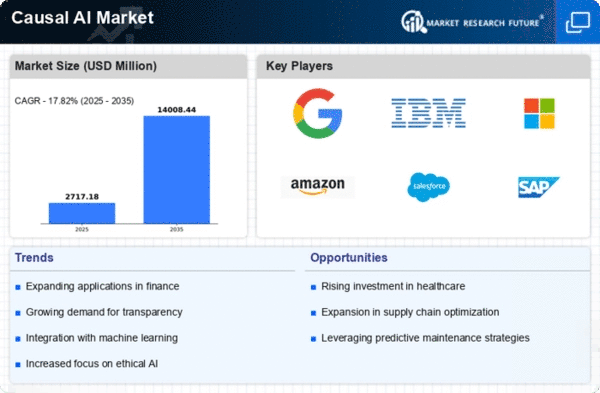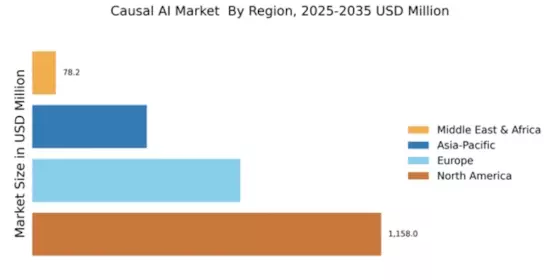The Causal AI Market is currently characterized by a dynamic competitive landscape, driven by rapid advancements in artificial intelligence and increasing demand for data-driven decision-making. Major players such as Google (US), IBM (US), and Microsoft (US) are at the forefront, leveraging their technological prowess to innovate and expand their offerings. Google (US) focuses on enhancing its AI capabilities through continuous investment in research and development, while IBM (US) emphasizes strategic partnerships to integrate Causal AI into its cloud services. Microsoft (US) is also actively pursuing collaborations to enhance its Azure platform, thereby solidifying its position in the market. Collectively, these strategies foster a competitive environment that is increasingly centered around innovation and technological integration.In terms of business tactics, companies are increasingly localizing their operations to better serve regional markets, optimizing supply chains to enhance efficiency, and investing in talent acquisition to drive innovation. The market structure appears moderately fragmented, with a mix of established players and emerging startups. This fragmentation allows for diverse approaches to Causal AI, as companies seek to differentiate themselves through unique value propositions and specialized offerings.
In November Google (US) announced the launch of its new Causal AI toolkit, designed to empower businesses with advanced predictive analytics capabilities. This strategic move is significant as it positions Google (US) to capture a larger share of the market by providing tools that facilitate data-driven insights, thereby enhancing decision-making processes for enterprises. The introduction of this toolkit is likely to attract a diverse clientele, from small businesses to large corporations, seeking to leverage AI for competitive advantage.
In October IBM (US) entered into a partnership with a leading financial services firm to integrate Causal AI into their risk management systems. This collaboration underscores IBM's commitment to applying AI solutions in critical sectors, enhancing operational efficiency and risk assessment capabilities. By aligning with a key player in the financial industry, IBM (US) not only strengthens its market presence but also showcases the practical applications of Causal AI in addressing complex business challenges.
In September Microsoft (US) unveiled a new feature within its Azure platform that incorporates Causal AI to optimize supply chain management for its clients. This development is particularly noteworthy as it reflects Microsoft's strategy to embed AI capabilities into its existing services, thereby enhancing the value proposition for its customers. By focusing on supply chain optimization, Microsoft (US) addresses a pressing need in the market, positioning itself as a leader in providing comprehensive AI solutions.
As of December the competitive trends in the Causal AI Market are increasingly defined by digitalization, sustainability, and the integration of AI technologies across various sectors. Strategic alliances are playing a crucial role in shaping the landscape, as companies recognize the importance of collaboration in driving innovation. Looking ahead, competitive differentiation is expected to evolve, with a shift from price-based competition to a focus on innovation, technological advancements, and supply chain reliability. This transition suggests that companies that prioritize these elements will likely emerge as leaders in the Causal AI Market.

















